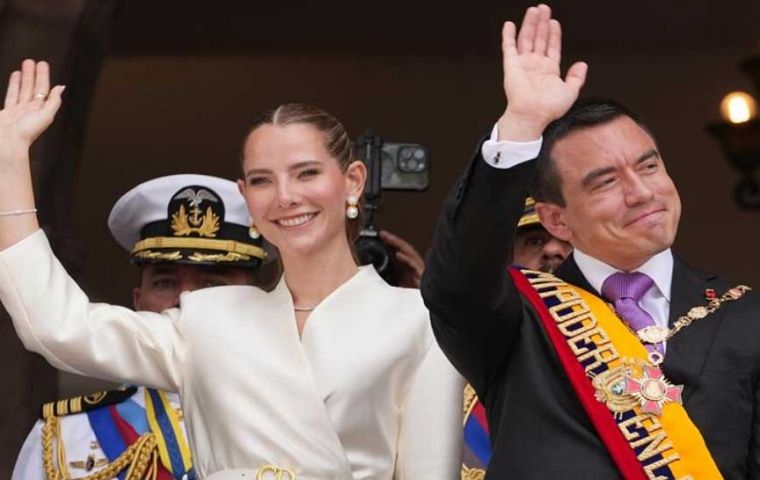MercoPress. South Atlantic News Agency
Noboa sworn in for second term as President of Ecuador
 Noboa faces challenges like violence and unemployment in his second term
Noboa faces challenges like violence and unemployment in his second term Ecuador's re-elected President Daniel Noboa was sworn in for a new four-year term in Quito, alongside Vice President Maria Jose Pinto. In his inaugural speech, Noboa pledged to advance steadily, “implementing each and every one of the necessary reforms to build a State that is not a burden to society”, in addition to putting “a solid foundation for the growth of employment, investment.”
He also pointed out that “we are at the gates of four years of progress” while offering a tough fight against corruption, drug trafficking, and criminal violence. Legislature Speaker Niels Olsen took Noboa's oath of office and girded him with the presidential sash.
Attendees included Presidents Gustavo Petro of Colombia and Dina Boluarte of Peru, as well as the US Secretary of Health, Robert F. Kennedy, Jr.
Noboa faces challenges like violence and unemployment in his second term. His National Democratic Action (ADN) movement secured a strong position in the Assembly after defeating leftist Luisa González in the April 13 elections.
The opposition, led by Rafael Correa's Revolución Ciudadana, boycotted the ceremony, alleging electoral fraud, though these claims were dismissed by electoral authorities.
Petro called for Noboa to free “political prisoners,” specifically mentioning former Vice President Jorge Glas, who is under arrest for corruption and faces ongoing legal proceedings. Glas, former vice president of Correa and Lenín Moreno (2017-2021), is serving two sentences of eight and six years in a prison in Guayaquil for corruption cases, and faces a new judicial process, although he maintains that it is part of a “political persecution.”
The 37-year-old Noboa was reelected on April 13 after winning against the left-wing opposition, Luisa González, and obtained with his National Democratic Action (ADN) movement the necessary seats and the support of other sectors to become the main political force in the Assembly. His parliamentary majority, though described as “weak” by some, is expected to aid governance.
Olsen spoke of “the decision to walk together the Executive and the Legislative, because governability means to understand that we can have differences, but that the country demands us to be united in the essentials.”
“In this historic moment, Ecuador needs all its functions to walk on the same side of the citizens, without calculations, without tricks and without excuses, because when a country is wounded, the first thing it needs is that those who represent it work together, without egos or trenches,” he further noted.




Top Comments
Disclaimer & comment rulesCommenting for this story is now closed.
If you have a Facebook account, become a fan and comment on our Facebook Page!